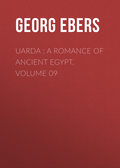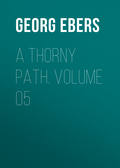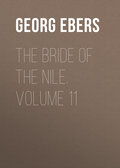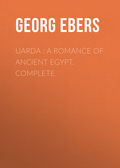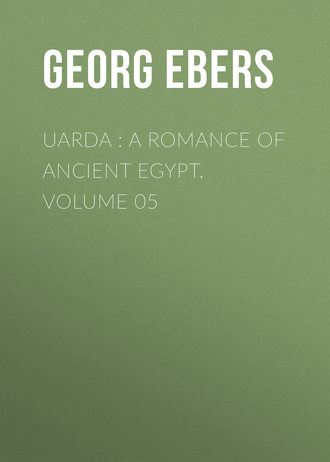
Georg Ebers
Uarda : a Romance of Ancient Egypt. Volume 05
"Perhaps I am doubly guilty for playing such an accursed trick with the heart of a high-priest; but Rui's body will be hung round with a hundred amulets, Scarabaei
[Imitations of the sacred beetle Scarabaeus made of various materials were frequently put into the mummies in the place of the heart. Large specimens have often the 26th, 30th, and 64th chapters of the Book of the Dead engraved on them, as they treat of the heart.
will be placed over his heart, and holy oil and sacred sentences will preserve him from all the fiends on his road to Amenti,—[Underworld]– while no one will devote helping talismans to the poor. And then! thou hast sworn, in that world, in the hall of judgment, to take my guilt on thyself."
Nebsecht gave the old man his hand.
"That I will," said he, "and I should have chosen as you did. Now take this draught, divide it in four parts, and give it to Uarda for four evenings following. Begin this evening, and by the day after to-morrow I think she will be quite well. I will come again and look after her. Now go to rest, and let me stay a while out here; before the star of Isis is extinguished I will be gone, for they have long been expecting me at the temple."
When the paraschites came out of his but the next morning, Nebsecht had vanished; but a blood-stained cloth that lay by the remains of the fire showed the old man that the impatient investigator had examined the heart of the high-priest during the night, and perhaps cut it up.
Terror fell upon him, and in agony of mind he threw himself on his knees as the golden bark of the Sun-God appeared on the horizon, and he prayed fervently, first for Uarda, and then for the salvation of his imperilled soul.
He rose encouraged, convinced himself that his granddaughter was progressing towards recovery, bid farewell to his wife, took his flint knife and his bronze hook,
[The brains of corpses were drawn out of the nose with a hook. Herodotus II. 87.]
and went to the house of the embalmer to follow his dismal calling.
The group of buildings in which the greater number of the corpses from Thebes went through the processes of mummifying, lay on the bare desert- land at some distance from his hovel, southwards from the House of Seti at the foot of the mountain. They occupied by themselves a fairly large space, enclosed by a rough wall of dried mud-bricks.
The bodies were brought in through the great gate towards the Nile, and delivered to the kolchytes,—[The whole guild of embalmers]—while the priests, paraschites, and tariclleutes,—[Salter of the bodies]– bearers and assistants, who here did their daily work, as well as innumerable water-carriers who came up from the Nile, loaded with skins, found their way into the establishment by a side gate.
At the farthest northern building of wood, with a separate gate, in which the orders of the bereaved were taken, and often indeed those of men still in active life, who thought to provide betimes for their suitable interment.
The crowd in this house was considerable. About fifty men and women were moving in it at the present moment, all of different ranks, and not only from Thebes but from many smaller towns of Upper Egypt, to make purchases or to give commissions to the functionaries who were busy here.
This bazaar of the dead was well supplied, for coffins of every form stood up against the walls, from the simplest chest to the richly gilt and painted coffer, in form resembling a mummy. On wooden shelves lay endless rolls of coarse and fine linen, in which the limbs of the mummies were enveloped, and which were manufactured by the people of the embalming establishment under the protection of the tutelar goddesses of weavers, Neith, Isis and Nephthys, though some were ordered from a distance, particularly from Sais.
There was free choice for the visitors of this pattern-room in the matter of mummy-cases and cloths, as well as of necklets, scarabaei, statuettes, Uza-eyes, girdles, head-rests, triangles, split-rings, staves, and other symbolic objects, which were attached to the dead as sacred amulets, or bound up in the wrappings.
There were innumerable stamps of baked clay, which were buried in the earth to show any one who might dispute the limits, how far each grave extended, images of the gods, which were laid in the sand to purify and sanctify it—for by nature it belonged to Seth-Typhon—as well as the figures called Schebti, which were either enclosed several together in little boxes, or laid separately in the grave; it was supposed that they would help the dead to till the fields of the blessed with the pick-axe, plough, and seed-bag which they carried on their shoulders.
The widow and the steward of the wealthy Superior of the temple of Hatasu, and with them a priest of high rank, were in eager discussion with the officials of the embalming-House, and were selecting the most costly of the patterns of mummy-cases which were offered to their inspection, the finest linen, and amulets of malachite, and lapis-lazuli, of blood-stone, carnelian and green felspar, as well as the most elegant alabaster canopi for the deceased; his body was to be enclosed first in a sort of case of papier-mache, and then in a wooden and a stone coffin. They wrote his name on a wax tablet which was ready for the purpose, with those of his parents, his wife and children, and all his titles; they ordered what verses should be written on his coffin, what on the papyrus- rolls to be enclosed in it, and what should be set out above his name. With regard to the inscription on the walls of the tomb, the pedestal of the statue to be placed there and the face of the stele—[Stone tablet with round pediment.]—to be erected in it, yet further particulars would be given; a priest of the temple of Seti was charged to write them, and to draw up a catalogue of the rich offerings of the survivors. The last could be done later, when, after the division of the property, the amount of the fortune he had left could be ascertained. The mere mummifying of the body with the finest oils and essences, cloths, amulets, and cases, would cost a talent of silver, without the stone sarcophagus.
The widow wore a long mourning robe, her forehead was lightly daubed with Nile-mud, and in the midst of her chaffering with the functionaries of the embalming-house, whose prices she complained of as enormous and rapacious, from time to time she broke out into a loud wail of grief— as the occasion demanded.
More modest citizens finished their commissions sooner, though it was not unusual for the income of a whole year to be sacrificed for the embalming of the head of a household—the father or the mother of a family. The mummifying of the poor was cheap, and that of the poorest had to be provided by the kolchytes as a tribute to the king, to whom also they were obliged to pay a tax in linen from their looms.
This place of business was carefully separated from the rest of the establishment, which none but those who were engaged in the processes carried on there were on any account permitted to enter. The kolchytes formed a closely-limited guild at the head of which stood a certain number of priests, and from among them the masters of the many thousand members were chosen. This guild was highly respected, even the taricheutes, who were entrusted with the actual work of embalming, could venture to mix with the other citizens, although in Thebes itself people always avoided them with a certain horror; only the paraschites, whose duty it was to open the body, bore the whole curse of uncleanness. Certainly the place where these people fulfilled their office was dismal enough.
The stone chamber in which the bodies were opened, and the halls in which they were prepared with salt, had adjoining them a variety of laboratories and depositaries for drugs and preparations of every description.
In a court-yard, protected from the rays of the sun only by an awning, was a large walled bason, containing a solution of natron, in which the bodies were salted, and they were then dried in a stone vault, artificially supplied with hot air.
The little wooden houses of the weavers, as well as the work-shops of the case-joiners and decorators, stood in numbers round the pattern-room; but the farthest off, and much the largest of the buildings of the establishment, was a very long low structure, solidly built of stone and well roofed in, where the prepared bodies were enveloped in their cerements, tricked out in amulets, and made ready for their journey to the next world. What took place in this building—into which the laity were admitted, but never for more than a few minutes—was to the last degree mysterious, for here the gods themselves appeared to be engaged with the mortal bodies.
Out of the windows which opened on the street, recitations, hymns, and lamentations sounded night and day. The priests who fulfilled their office here wore masks like the divinities of the under-world. Many were the representatives of Anubis, with the jackal-head, assisted by boys with masks of the so-called child-Horus. At the head of each mummy stood or squatted a wailing-woman with the emblems of Nephthys, and one at its feet with those of Isis.
Every separate limb of the deceased was dedicated to a particular divinity by the aid of holy oils, charms, and sentences; a specially prepared cloth was wrapped round each muscle, every drug and every bandage owed its origin to some divinity, and the confusion of sounds, of disguised figures, and of various perfumes, had a stupefying effect on those who visited this chamber. It need not be said that the whole embalming establishment and its neighborhood was enveloped in a cloud of powerful resinous fumes, of sweet attar, of lasting musk, and pungent spices.
When the wind blew from the west it was wafted across the Nile to Thebes, and this was regarded as an evil omen, for from the south-west comes the wind that enfeebles the energy of men—the fatal simoon.
In the court of the pattern-house stood several groups of citizens from Thebes, gathered round different individuals, to whom they were expressing their sympathy. A new-comer, the superintendent of the victims of the temple of Anion, who seemed to be known to many and was greeted with respect, announced, even before he went to condole with Rui's widow, in a tone full of horror at what had happened, that an omen, significant of the greatest misfortune, had occurred in Thebes, in a spot no less sacred than the very temple of Anion himself.
Many inquisitive listeners stood round him while he related that the Regent Ani, in his joy at the victory of his troops in Ethiopia, had distributed wine with a lavish hand to the garrison of Thebes, and also to the watchmen of the temple of Anion, and that, while the people were carousing, wolves
[Wolves have now disappeared from Egypt; they were sacred animals, and were worshipped and buried at Lykopolis, the present Siut, where mummies of wolves have been found. Herodotus says that if a wolf was found dead he was buried, and Aelian states that the herb Lykoktonon, which was poisonous to wolves, might on no account be brought into the city, where they were held sacred. The wolf numbered among the sacral animals is the canis lupaster, which exists in Egypt at the present day. Besides this species there are three varieties of wild dogs, the jackal, fox, and fenek, canis cerda.]
had broken into the stable of the sacred rams. Some were killed, but the noblest ram, which Rameses himself had sent as a gift from Mendes when he set out for the war—the magnificent beast which Amon had chosen as the tenement of his spirit, was found, torn in pieces, by the soldiers, who immediately terrified the whole city with the news. At the same hour news had come from Memphis that the sacred bull Apis was dead.
All the people who had collected round the priest, broke out into a far- sounding cry of woe, in which he himself and Rui's widow vehemently joined.
The buyers and functionaries rushed out of the pattern-room, and from the mummy-house the taricheutes, paraschites and assistants; the weavers left their looms, and all, as soon as they had learned what had happened, took part in the lamentations, howling and wailing, tearing their hair and covering their faces with dust.
The noise was loud and distracting, and when its violence diminished, and the work-people went back to their business, the east wind brought the echo of the cries of the dwellers in the Necropolis, perhaps too, those of the citizens of Thebes itself.
"Bad news," said the inspector of the victims, cannot fail to reach us soon from the king and the army; he will regret the death of the ram which we called by his name more than that of Apis. It is a bad—a very bad omen."
"My lost husband Rui, who rests in Osiris, foresaw it all," said the widow. "If only I dared to speak I could tell a good deal that many might find unpleasant."
The inspector of sacrifices smiled, for he knew that the late superior of the temple of Hatasu had been an adherent of the old royal family, and he replied:
"The Sun of Rameses may be for a time covered with clouds, but neither those who fear it nor those who desire it will live to see its setting."
The priest coldly saluted the lady, and went into the house of a weaver in which he had business, and the widow got into her litter which was waiting at the gate.
The old paraschites Pinem had joined with his fellows in the lamentation for the sacred beasts, and was now sitting on the hard pavement of the dissecting room to eat his morsel of food—for it was noon.
The stone room in which he was eating his meal was badly lighted; the daylight came through a small opening in the roof, over which the sun stood perpendicularly, and a shaft of bright rays, in which danced the whirling motes, shot down through the twilight on to the stone pavement. Mummy-cases leaned against all the walls, and on smooth polished slabs lay bodies covered with coarse cloths. A rat scudded now and then across the floor, and from the wide cracks between the stones sluggish scorpions crawled out.
The old paraschites was long since blunted to the horror which pervaded this locality. He had spread a coarse napkin, and carefully laid on it the provisions which his wife had put into his satchel; first half a cake of bread, then a little salt, and finally a radish.
But the bag was not yet empty.
He put his hand in and found a piece of meat wrapped up in two cabbage- leaves. Old Hekt had brought a leg of a gazelle from Thebes for Uarda, and he now saw that the women had put a piece of it into his little sack for his refreshment. He looked at the gift with emotion, but he did not venture to touch it, for he felt as if in doing so he should be robbing the sick girl. While eating the bread and the radish he contemplated the piece of meat as if it were some costly jewel, and when a fly dared to settle on it he drove it off indignantly.
At last he tasted the meat, and thought of many former noon-day meals, and how he had often found a flower in the satchel, that Uarda had placed there to please him, with the bread. His kind old eyes filled with tears, and his whole heart swelled with gratitude and love. He looked up, and his glance fell on the table, and he asked himself how he would have felt if instead of the old priest, robbed of his heart, the sunshine of his old age, his granddaughter, were lying there motionless. A cold shiver ran over him, and he felt that his own heart would not have been too great a price to pay for her recovery. And yet! In the course of his long life he had experienced so much suffering and wrong, that he could not imagine any hope of a better lot in the other world. Then he drew out the bond Nebsecht had given him, held it up with both hands, as if to show it to the Immortals, and particularly to the judges in the hall of truth and judgment, that they might not reckon with him for the crime he had committed—not for himself but for another—and that they might not refuse to justify Rui, whom he had robbed of his heart.
While he thus lifted his soul in devotion, matters were getting warm outside the dissecting room. He thought he heard his name spoken, and scarcely had he raised his head to listen when a taricheut came in and desired him to follow him.




